Information Systems and Communications Ph.D.
Acquire the interdisciplinary knowledge and research skills to become a scholar and leader in the critical nexus of information systems and communications.
Information Session
Thursday, February 19, 2026 at 5:00 PM
PH.D. Information Systems and Communications Virtual Information Session
Join us virtually to learn about the Ph.D in Information Systems and Communications. Our Program Director, Dr. Karen Paullet, will explain how this three-year program is designed to meet the needs of IT and communications professionals. Ideal for individuals who wish to excel in leadership roles in industry, as well as educators and researchers in information systems, technology, or communication fields. We will be talking about program requirements, degree progression and alumni outcomes. There will also be time at the end for questions.
We will be talking about program requirements, degree progression and alumni outcomes. There will also be time at the end for questions.
Information Systems and Communications (ISC) is a 3-year, executive-style Ph.D. program designed to meet the needs of working executives and professionals who wish to excel in leadership roles in industry, as well as of educators and researchers in information systems, technology, or communications fields.
- Interdisciplinary Program: The program prepares students with a deep understanding of the connections between information technology and human communication. Students explore both technology-driven and communication-based problems, focusing on understanding the impacts of this interdisciplinary field on both the workplace and society.
- Faculty Scholars: The program is taught by a supportive and engaged faculty who are active in research and experts in their fields of study.
- Cohort Model: Students advance through the program as a cohort, taking courses together as a group and building professional and personal networks.
- High Success Rate: The cohort model and face-to-face residencies help to minimize isolation and enable success, with over 90% of students completing their degree within 3 years.
Blended Learning Format (Online + On-campus Residencies)
The blended learning format features online and immersive on-campus residencies that allow for flexibility and high levels of engagement with faculty and other students in the program. Each course includes an online component which adds flexibility, reducing the travel time required for the program, and giving the freedom to complete some of the course requirements from anywhere anytime.
Online Component
Students will engage with faculty online, in a combination of synchronous online meetings (6 hours per course, scheduled over 3 Saturdays) and asynchronous online activities.
Face-to-Face Residencies
5-day residencies (one in late August and one in early January)
3-day weekend residencies (one in October and one in March)
- Program Overview
-
The ISC Ph.D. addresses the challenges and complexities of our increasingly technological, Internet-connected, and data-driven society by preparing leaders and educators to conduct research, make decisions, and solve problems through integrative perspectives drawn from the fields of information systems and communications.
Curriculum
This accelerated program includes 60 credits of coursework:
- 27 credits of interdisciplinary content courses in information systems and communications
- 21 credits of research methodology courses
- 12 credits of directed studies focused on dissertation writing
The program culminates in a dissertation representing original research in the field of information systems and/or communications. The proposal and defense of this dissertation are primary requirements for the degree.
Year 1 - Fall
- ISCM8110 Theories in Action in ISC
- ISCM8120 ISC in Cybersociety
- ISCM8130 Intro to Research Process for ISC
Year 1 - Spring
- ISCM8140 Information Technology and Online Social Behavior
- ISCM8160 Rhetorical, Semiotic, and Ethno-cultural Foundations for ISC
- ISCM8180 Literature Review
- ISCM9100 Dissertation I – Research Topic Development
Year 2 - Fall
- ISCM8150 Theory Development & Knowledge Management
- ISCM8230 Quantitative Research Methods I
- ISCM8240 Qualitative Research Methods
Year 2 - Spring
- ISCM8210 Advanced Research Design for ISC
- ISCM8220 Data Analytics: Managerial Perspectives
- ISCM8260 Leadership, Culture & Communication
- ISCM9200 Dissertation II – Proposal Completion & Defense
Year 3 - Fall
- ISCM8380 Analyzing and Interpreting Data
- ISCM8320 Information Security and the Law
- ISCM9300 Dissertation III - Data Analysis & Research Findings
Year 3 - Spring
- ISCM8310 Economics of Information Systems and Technology in the Digital Age
- ISCM8330 Contemporary Issues in ISC
- ISCM9400 Dissertation IV – Dissertation Completion & Defense
Program Milestones
The Ph.D. in Information Systems and Communications program includes several milestones:
- At the end of the first year: A qualifying exam of study on critical thinking and proficiency in research writing. Upon passing the exam, the student is admitted into doctoral candidacy.
- At the end of the second year: Dissertation proposal defense to the student’s doctoral committee.
- At the end of the third year: Doctoral dissertation defense to the student’s doctoral committee
- Admissions Requirements and Tuition
-
Each new cohort accepted into the Ph.D. in Information Systems and Communications (ISC) program enrolls in the Fall semester (starting in August each year).
Minimum admission requirements:
- Master’s degree from an accredited institution
- Minimum graduate GPA of 3.0
- Completed online application to the program (www.rmu.edu/apply) with required application materials
- Official transcripts of all undergraduate and graduate course work;
- Three (3) letters of reference from individuals in professional or academic communities who are familiar with the applicant’s work;
- A current resume that includes all education, professional work experience, certifications, and other relevant information;
- An academic writing sample (this can be an academic paper previously completed for a Master’s degree program, a publication, or in lieu of either of the first two options, a 4-5 page essay focusing on a problem related to information systems or communications experienced or observed in the workplace)
- Personal interview with the Doctoral Program Director and Doctoral Admissions Committee.
International students applying to the program must also provide results from a test of English language proficiency.
Please see RMU Tuition and Fees for current tuition rates.
- Research Areas
-
Our doctoral students take on a broad range of topics and problems related to information systems and communications. Some of our key research areas include:
- Faculty Bios
-
 Dr. Stuart Allen
Dr. Stuart Allen
Professor of Organizational LeadershipDr. Stuart Allen is a University Professor in the School of Communications and Organizational Leadership and teaches research design in the PhD program. He started his career as an industrial-organizational psychologist, and practiced for 10 years before becoming an academic. He also served as a CEO of a nonprofit leadership development center for 5 years. Dr. Allen has consulted to organizations in the education, for-profit, healthcare, nonprofit, and civil sectors on issues like change, organizational development, leadership development and coaching, and team development. He has a Bachelors and Master’s degree in Industrial-Organizational Psychology and PhDs in Organizational Leadership and Business, Management, and Administration. He is an active researcher with interests in leadership, inclusive classrooms, succession planning, human resource development, PTSD, environmental sustainability, workplace and leadership spirituality, ethics, conflict, leadership education, and organizational behavior. He has published in A rated journals such as the Journal of Business Ethics, Business & Society, and Journal of Management Inquiry and has edited and published three books. He has won awards and grants including best paper awards at the International Leadership Association and Academy of Management, and the RMU President's Distinguished Faculty Achievement Award for Scholarship. His research is listed on GoogleScholar: https://scholar.google.com/citations?user=kDHzvYUAAAAJ
 Dr. Natalya Bromall
Dr. Natalya Bromall
Professor of Computer and Information SystemsDr. Bromall is a professor of Computer Information Systems and a Graduate Program Director at RMU. I was born in Ivanovo, Russia, and received my BS and MS degrees in Mathematics from Ivanovo State University. I came to the United States in 2001 to work on my Doctoral degree at Utah State University, graduated in 2006 with a Ph.D. in Business Information Systems and Education, and moved to Pittsburgh, where I held faculty positions in a few universities, until joining RMU in 2013. My areas of interest include Cloud Computing, Artificial Intelligence/ Machine Learning, Cyber Security, programming, and Database Management. I am a certified AWS Solutions Architect and AWS Academy Educator. I have lots of hobbies, including sports (skiing, biking, and golf), reading, crafts, and learning languages. I enjoy traveling and learning about people and their cultures.
 Dr. A.J. Grant
Dr. A.J. Grant
University Professor of Organizational LeadershipA.J. Grant is a University Professor of Organizational Leadership, teaching undergraduate and graduate courses in rhetoric, communications, history of leadership and ethics. Grant’s research interests include leadership education, rhetorical criticism, the history of communication and popular culture topics. He has published articles on these topics and others in journals like the Journal of American Culture, Journal of Organization Cultures: An International Journal, Rhetoric Society Quarterly, Journal of Hate Studies and Leadership and the Humanities. He received a Ph.D. in Rhetoric and English from Northern Illinois University, an MAT from Wheaton Graduate School, an M. Div. from McCormick Seminary, and a BA in English Literature and Writing from the University of Pittsburgh.
 Dr. Frank Hartle
Dr. Frank Hartle
Assistant Professor of Computer and Information Systems and Criminal JusticeDr. Frank Hartle is the Vice Dean of the College of Business and STEM at Robert Morris University. Dr. Hartle holds a Doctorate in Information Systems and Communications from Robert Morris University, a Master’s in Criminal Justice Administration from Point Park University, and a Bachelor’s in Computer Systems Technology from Duquesne University.
With over two decades of experience, Dr. Hartle has held several administrative roles at RMU, including Interim Dean and Associate Dean, Assistant Dean, and Director, and has contributed to program development in cyber investigations, criminal Justice, cyber security, and applied artificial intelligence. His teaching portfolio spans criminal justice, cyber investigations/intelligence, cybersecurity, and information systems, with courses focusing on cybercrime, terrorism, and intelligence studies.
Dr. Hartle has co-authored numerous peer-reviewed publications, including works on mobile technology in crisis management, the impact of social media geolocation on national security, and introducing the Deep and Dark Web into higher education pedagogy. His research bridges law enforcement, cybersecurity, and technology innovation.
Dr. Hartle's career also includes service as a retired Assistant Federal Security Director for the Department of Homeland Security, Pittsburgh Police Detective, and a combat veteran of the U.S. Army, reflecting his lifelong commitment to public safety and education.
 Dr. Ann Summerall Jabro
Dr. Ann Summerall Jabro
University Professor of CommunitcationAnn D. Summerhall-Jabro is a university professor of communication and organizational leadership. An award-winning teacher, service learning strategist, consultant, and former union president, Dr. Jabro's research interests parallel her teaching and service activities: chemical manufacturing operations' community outreach efforts, leadership during technological innovation, risk and crisis communication approaches and implementation successes; facilitation and reputation management during conflicts and culture change in higher education, union negotiations and student preparedness for academic success; working in diverse teams using technology for effectiveness and efficiency, small group dynamics, facilitating leaders and task completion. Dr. Jabro has also studied family dynamics during the dying and death processes, Mardi Gras customs, the New Orleans Jazz and Heritage Foundation and Festival's development of public relations practices, reputation management and community integration.
 Dr. Edward Karshner
Dr. Edward Karshner
Professor of EnglishAfter earning a Ph.D. in Rhetoric and Philosophy from Bowling Green State University, Edward Karshner began exploring cultural rhetoric as expressed in folklore. His primary interest was how landscape influences folk-ideologies. In the early part of his career, he travelled extensively in China, Slovakia, Austria, and the Czech Republic before spending over a decade working with the Dinè (Navajo). For the last ten years, he has returned to researching, teaching and writing about Appalachian folklore, magic, and mysticism. A 2022 Research Fellow in Folklore at Berea College’s Special Collections and Archives, Karshner is the author of “These Stories Sustain Me” in the collection Appalachian Reckoning: A Region Replies to Hillbilly Elegy. He is the folklore columnist for Reckon Review where he writes about the intersections of folklore and literature. His short fiction has appeared in numerous anthologies and in Still: The Journal. Karshner is a professor of English and Department Head of English and Media Arts.
Dr. Steve Mancini
Assistant Professor of Computer Information SystemsDr. Steve Mancini is considered an expert in leadership, cybersecurity, and challenges of cybercrime. He holds a Doctorate in Business Administration and has spent the past 30 years between the public and private sector working in a variety of technical and leadership roles related to cybersecurity, including his time as an officer in the US Air Force. He has taught at various universities such as the National Defense University, University of Pittsburgh, Seton Hill, and Carlow University, and now teaches at Robert Morris University as an associate professor. He’s also an international speaker and trainer and has published various articles on cybersecurity and cybercrime related issues.
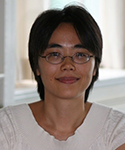 Dr. Min Lu
Dr. Min Lu
Professor of EconomicsMin Lu, Ph.D. is a Professor of Economics at Robert Morris University. She received her Ph.D. in Economics from the University of British Columbia (Canada). Her current research interests are: international finance, monetary economics and e-commerce. She joined Robert Morris University in 2007. She was also a financial analyst for the International Division of the Bank of China. Her research papers have appeared in the International Journal of Electronic Commerce, Journal of Business and Economics Research, International Journal of Monetary Economics and Finance, and among others. She is the recipient of many awards.
 Dr. Sushma Mishra
Dr. Sushma Mishra
Professor of Computer and Information SystemsSushma Mishra is the Assistant Dean of the College of Business and STEM at Robert Morris University. She is a Professor of Cybersecurity in the Department of Computer and Information Systems. She was the Director of the doctoral program in Information Systems and communications. Dr. Mishra’s research interest lies in organizational issues in cybersecurity, including security governance mechanisms, AI in cybersecurity, healthcare security, gender representation in cybersecurity, etc. She has 20-plus years of experience teaching cybersecurity courses such as IT governance, security policies, disaster recovery, etc. She has been co-PI on multiple NSF grants. Dr. Mishra’s research has won several awards at various conferences worldwide. She has been an active reviewer and associate editor in numerous journals.
 Dr. Anthony Moretti
Dr. Anthony Moretti
Associate Professor of CommunicationDr. Anthony Moretti is the department head of and an associate professor in the Department of Communication and Organizational Leadership. He's been at RMU for more than a decade and part of the doctoral program since 2023. At the undergraduate level, he primarily teaches journalism and communication courses.
His research interests typically focus on the interaction of media, politics and news. Dr. Moretti's published research has included content analysis of reporting of major decisions made by US presidents, the bilateral relationship between the US and other nations, and major international sport events. He's co-authored one book and written multiple book chapters. In addition, he served as co-editor for the peer reviewed journal Electronic News for seven years, and he's been on multiple editorial boards and part of many academic organizations.
Before coming to RMU, Dr. Moretti taught at Texas Tech and Point Park universities. He earned his PhD from the E.W. Scripps School of Journalism in 2004.
 Dr. Sun-A Park
Dr. Sun-A Park
Associate Professor of CommunicationSun-A Park, Ph.D is an Associate Professor in the Department of Communication and Organizational Leadership. She joined the communication faculty at RMU in the fall of 2011 and teaches courses in public relations and communication. She earned both her M.A. and Ph.D. in Journalism, with an emphasis in Strategic Communication, from the University of Missouri School of Journalism, and a B.A. in Public Relations and Advertising from Sookmyung Women’s University in Seoul, South Korea. Dr. Park’s research interests include social media management, health and crisis communication, focusing on areas such as consumer health crises, public health crisis communication, and ethics in social media management. Her recent research explores the dynamics of paracrisis communication in the digital age, with particular emphasis on public-centric approaches to understanding the interplay between organizational communication strategies and public perceptions during high-visibility reputational challenges.
 Dr. Karen Paullet
Dr. Karen Paullet
Professor of Computer and Information SystemsDr. Karen Paullet is the Director of the PhD in Information Systems and Communications and a Professor in the School of Data Intelligence and Technology. She has been a faculty member at Robert Morris University since May of 2009. She holds a D.Sc. in Information Systems and Communications, a MS in Communications and Information Systems and BS in Information Systems from Robert Morris University. In addition, Dr. Paullet has spent over 13 years working with law enforcement preparing cases using digital evidence for trial. Her research interests are mobile forensics, artificial intelligence, and cybersecurity. She has spoken at over 200 engagements nationally to include agencies such as NASA, the Nuclear Regulatory Commission, and the Department of Energy on Mobile Security Threats, Privacy of Information and Cybersecurity issues. Her work has been published through various journals to include Issues in Information Systems, Journal of Information Systems (JISE) and the Journal of Systems Applied Research (JISAR). She has been the PI on multiple NSF cyber grants. Dr. Paullet has received numerous awards to include Distinguished Achievement Award for Service, Excellence in Teaching Award and RMU’s Presidential Award for Service. She brings her professional experience and teaching to serve and educate others.
 Dr. Jamie Pinchot
Dr. Jamie Pinchot
Professor of Computer and Information SystemsJamie Pinchot is a University Professor of Computer and Information Systems at Robert Morris University and is the Department Head for CIS. Dr. Pinchot earned a D.Sc. in Information Systems and Communications and an MS in Communications and Information Systems from Robert Morris University. She received her BA in Computer Science and AA in Management Information Systems from Thiel College. Her research interests include mobile technologies, information security and privacy, information design, social media, and the intersection of technology use and culture. Dr. Pinchot spent more than nine years working in IT in various capacities including web development, web interface design, web integration with legacy systems and most recently as a Senior IT Consultant specializing in enterprise online collaboration tools, social media, and mobile technologies. She has published papers in journals such as the Journal of Information Systems Education (JISE), the Journal of Information Systems Applied Research (JISAR), Information Systems Education Journal (ISEDJ), and Issues in Information Systems (IIS).
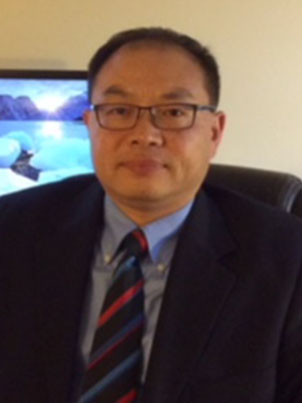 Dr. Ping Wang
Dr. Ping Wang
University Professor of Computer and Information SystemsDr. Ping Wang is University Professor of Computer and Information Systems and the Point of Contact of RMU's National Center of Academic Excellence in Cyber Defense (NCAE-CD) designation by NSA/DHS. He has taught and published research on various topics of IS/IT, Cybersecurity, and Communication, including AI in Cybersecurity, network security, Internet of Things (IoT), cybersecurity education and workforce development. He has a Ph.D. in Information Systems, a Master of Computer Information Science (MCIS), and an MA and BA in Linguistics. Dr. Wang is a Certified Information Systems Security Professional (CISSP) with senior consulting and leadership experience in Cybersecurity. He has served as Principal Investigator (PI) of multiple NSF and DoD grant projects and has received many awards for excellence in research, teaching, innovation, and mentoring. He has been an active member of the U.S. National Initiative for Cybersecurity Education (NICE) working group since 2016 and Associate Editor of the International Journal of Hyperconnectivity and the Internet of Things (IJHIoT) since 2017. Dr. Wang is an active reviewer and mentor for NCAE-CD designations and accreditation evaluator for both Middle States Commission on Higher Education and ABET Computing Accreditation Commission.
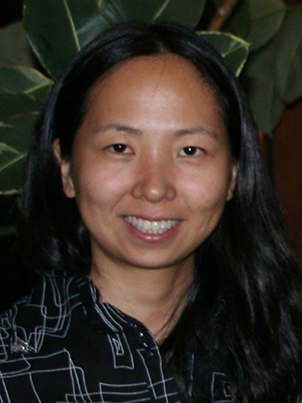 Dr. Wenli Wang
Dr. Wenli Wang
University Professor of Computer and Information SystemsWenli Wang is a University Professor of Computer and Information Systems. Her research interests include artificial intelligence, system science, cybersecurity, management science, game theory, health informatics, leadership, mindfulness, and social-technical issues in computing. She has over 30 journal publications and published in Journal of Economic Theory (JET), Decision Support Systems (DSS), IEEE Computer, Communications of the Association for Information Systems (CAIS), International Journal of Electronic Commerce (IJEC), Technology in Society, Journal of Information Systems Education (JISE), Journal of Information Technology Management (JITM) and Information System Education Journal (ISEJ). She has served on Editorial Review Board for Journal of Database Management (JDM) since 2004 and also serves on Journal of Computer Information Systems (JCIS). She is an Associated Editor for International Journal of Patient-Centered Healthcare (IJPCH). She holds a PhD in Management Science and Information Systems from University of Texas at Austin, and a BSc in Computer Engineering and Telecommunications from Beijing University of Posts and Telecommunications. She has held academic posts at Emory University and University of Nevada at Las Vegas. She is certified in Machine Learning from Nvidia, AWS, and DataRobot. She has over 15 years of doctoral education experience and was an invited faculty for AMCIS doctoral consortium.
 Chen Yang, Ph.D
Chen Yang, Ph.D
Associate Professor of CommunicationChen Yang, Ph.D., is an Associate Professor of Communication in the Department of Communication and Organizational Leadership. Dr. Yang earned his Master degree in Applied Statistics and Doctor’s degree in Media and Communication, both from Bowling Green State University. He joined Robert Morris University in 2018 and mainly teaches courses related to advertising, communication skills, mass media and quantitative research. Dr. Yang’s research interests include digital news’ effects on internet users, foreign products’ country image, and social media users’ behavior and psychology. He has presented his research in various conferences including National Communication Conference (NCA) as well as conferences for the Broadcast Education Association (BEA), the International Academy of Intercultural Research (IAIR), the Ohio Communication Association (OCA) and the Association for Education in Journalism and Mass Communication (AEJMC). Dr. Yang has published in various peer-reviewed scholarly journals including Journal of Asian Communication, Electronic News, Journalism, Global Media and China, and Pennsylvania Communication Annual.
- Our Alumni
-
As a graduate of our doctoral program, you will join more than 300 distinguished alumni. Of our alumni, approximately 40% work in the private sector, 35% in academic institutions, and 15% in think tanks, consulting firms, and government.
The following list is a sampling of organizations where our graduates work, research, and lead:
Private Sector:
- IBM
- Boeing
- UPMC
- CONSOL Energy, Inc.
- Kaiser Permanente
- Capital One
- Thermo Fisher Scientific
- PNC
- BNY Mellon
- Highmark Health Solutions
- Anthem
- Bayer HealthCare Pharmaceuticals LLC
- Westinghouse Electric Co.
- UPS
- Fragomen
- Bayer Crop Science LLC
- Salesforce
- DICK’s Sporting Goods
- WESCO International, Inc.
- General Electric Company
- Johnson & Johnson
- Duquesne Light Company
Academic Institutions:
- Carnegie Mellon University
- University of Pittsburgh
- Penn State University
- University of Maryland
- National Defense University
- Edinboro University
- Frostburg State University
- Dwight D. Eisenhower School for National Security and Resource Strategy
- Virginia Military Institute
- Indiana University of Pennsylvania
- Clarion University
- Florida Atlantic University
- Slippery Rock University
- Carlow University
- Grove City College
- California University of Pennsylvania
- Geneva College
- Middle Georgia State University
- Point Park University
Think Tanks, Consulting Firms, and Government:
- The MITRE Corporation
- Booz-Allen Hamilton, Inc.
- Department of Homeland Security
- Department of Defense
- Federal Bureau of Investigation (FBI)
- Air Force Office of Special Investigations
- U.S. Army Cyber Center of Excellence
- Department of the Army
- Department of the Navy
- Internal Revenue Service (IRS)
- Department of Veteran Affairs
- National Telecommunication and Information Administration
- Alumni Testimonials
-
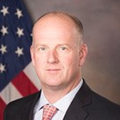 Michael Love, D.Sc. (Cohort 19, Class of 2020)
Michael Love, D.Sc. (Cohort 19, Class of 2020)
Lieutenant Colonel, U.S. Army
Deputy Chief, Cybersecurity Operations Center
National Geospatial Intelligence Agency“The doctoral program at Robert Morris was a challenging and rewarding journey that supported my goals as a life-long learner. The program helped me step into the world of academic research and opened doors to new opportunities that I would have never realized before this journey. Thank you!”
 Stuart Williams, D.Sc. (Cohort 19, Class of 2020)
Stuart Williams, D.Sc. (Cohort 19, Class of 2020)
Chief Technologist
The MITRE Corporation“The RMU information systems and communication doctoral program has been instrumental in adding the skills, credentials, and gravitas necessary to establish me as a capable thought leader among my peers and career engagements. The program allowed me to expand on my unique, existing area of expertise by applying core research and thought leadership principles, enabling me to contribute to knowledge in my field. The experience also allowed me to interact with other thought leaders from other domains, expanding my personal connections and network.
Immediately after graduation, I was able to put my new credentials to use by using my research and thought leadership skills gained through the doctoral program to support several efforts related to COVID-19 pandemic research and response efforts in the United States. Having the credentials provided immediate, recognizable credibility backed up with the capabilities and tools the RMU program provided me. I urge doctoral candidates and prospects to consider the unique programming offered by RMU's focused doctoral program as a key benefit to a targeted approach to a high-quality credential for your future.”
 Bill Carney, D.Sc. (Cohort 18, Class of 2019)
Bill Carney, D.Sc. (Cohort 18, Class of 2019)
Principle Systems Engineer
The MITRE Corporation“Family. That’s what immediately comes to mind when I think about my time at RMU. The Cohort, the Professors, the Staff, all coming together for an extraordinary educational purpose. I certainly do miss those times, but the Family gained is everlasting. Cohort 18 ‘One Team, One Fight!’”
 Fred Hoffman, D.Sc. (Cohort 18, Class of 2019)
Fred Hoffman, D.Sc. (Cohort 18, Class of 2019)
Interim Chairman, Intelligence Studies Department, Mercyhurst University
Assistant Professor of Intelligence Studies, Mercyhurst University“I am a big fan of the doctoral program at RMU! I successfully completed the program in May of 2019, and several months later was offered a teaching position at Mercyhurst University in Erie, PA, where I soon became the chairman of the Intelligence Studies department. One of my responsibilities is helping our Applied Intelligence graduate students develop, research, submit, and defend their master’s thesis – a task for which the RMU doctoral program prepared me well. One of the most noteworthy things about the RMU doctoral program is its extremely high success rate: Whereas virtually all other doctoral programs have a less than 50% success rate, the RMU program has maintained a roughly 90% graduation rate for two decades. As my co-authors and I explained in a published article on the subject, one of the factors contributing to this success rate is RMU’s cohort model. Our doctoral cohort was a very closely-knit group; we still keep in close contact with one another.”
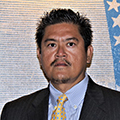 Alvi Lim, D.Sc. (Cohort 18, Class of 2019)
Alvi Lim, D.Sc. (Cohort 18, Class of 2019)
Lead Information Systems Engineer
The MITRE Corporation“The RMU Information Systems and Communications Doctoral Program has widened my field of studies, taught me how research is conducted, and challenged me to view the world with multiple lenses. The program at RMU is compact but achievable, with an extraordinary group of professors who is always available to guide you to success.”
 Jay Wang, D.Sc. (Cohort 18, Class of 2019)
Jay Wang, D.Sc. (Cohort 18, Class of 2019)
Principal Systems Engineer
The MITRE Corporation“I very much enjoyed and greatly benefited from the program's balanced coverage of both technical and cultural factors applied with both quantitative and qualitative methods. It was a blessing to learn from the diverse and rich professional and life experiences of peer students throughout the entire three years - brainstorming and bonding without peer pressure but plenty of peer support. I am a better practitioner and researcher thanks to the caring and capable faculty and staff.”
 Majed Afandi, D.Sc. (Cohort 17, Class of 2018)
Majed Afandi, D.Sc. (Cohort 17, Class of 2018)
Cybersecurity Risk Manager
Capital One“The atmosphere, analytical and scientific knowledge, and research tactics I experienced through this program are forever remarkable. What I learned and achieved throughout the program helped me grow in my professional life. In fact, a number of fortune organizations were interested in my dissertation findings which resulted in me accepting a suitable career opportunity in one of them. It is without a doubt, one of the best decisions I've ever made.”
 Anne Shepherd, D.Sc. (Cohort 17, Class of 2018)
Anne Shepherd, D.Sc. (Cohort 17, Class of 2018)
Associate Chief Information Officer
Internal Revenue Service“The RMU doctoral program was a game changer for me, fueling my research interest in innovation strategy and culture. The experience expanded my critical thinking and world view. Few programs at this level have such an engaging and supportive faculty which makes the RMU journey quite special.”
 Dave Verret, D.Sc. (Cohort 15, Class of 2016)
Dave Verret, D.Sc. (Cohort 15, Class of 2016)
Director, U.S. Army Signal School, Regional Signal Training Sites Division
U.S. Army Cyber Center of Excellence“I truly appreciated the doctoral program offered by RMU in Information Systems and Communications. What stood out to me were the quality instruction, scheduling, cost, and the awesome classmates in my cohort. RMU is a wonderful school with a staff that encourages the executive-level students with unparalleled support and enthusiasm. I truly enjoyed the residencies and the camaraderie, too, even though I had to travel from Georgia to participate – it was worth it!”
 Gary King, D.Sc. (Cohort 14, Class of 2015)
Gary King, D.Sc. (Cohort 14, Class of 2015)
Deputy Director, Cybersecurity
Office of Special Projects
Air Force Office of Special Investigations“I stopped considering other doctorate programs after attending an RMU informational session in the Washington, DC region. I was looking for an in-residence program that would allow me to continue working, and use my Post-9/11 GI Bill benefits. My interaction with the faculty, students in the area, and alumni provided me with a sense that RMU was the best academic institution for me to achieve the goal of earning a doctorate degree.
Robert Morris University provided others and me with an intellectual academic environment where students were encouraged to express and examine differing opinions, and allowed the application of out of box constructs to solve problems. That nurturement bred meaningful contributions to the bodies of evidence in our respective areas of study.
For me, from day one to post graduation, my continued interactions with faculty members, other students, and my cohort classmates has validated and reinforced that I made the correct decision in selecting RMU to pursue a Doctorate in Science in Information Systems and Communications. Without the benefit of hindsight…I still, without hesitation, would choose RMU as my first choice to pursue a doctorate degree.” Quinn Lanzendorfer, D.Sc. (Cohort 14, Class of 2015)
Quinn Lanzendorfer, D.Sc. (Cohort 14, Class of 2015)
Technical & Acquisition Program Manager
U.S. Department of Defense“The Information Systems & Communications doctoral program at Robert Morris University offers students the ability to take their knowledge to the next level. The program opens doors for publishing research and to be recognized as a subject matter expert.”
- Contact Information
-
 Dr. Karen Paullet
Dr. Karen Paullet Director, Information Systems and Communications Ph.D.
paullet@rmu.edu
412-397-6051
Sample Courses:
These are some of the classes for students in this academic program:
Call us at:
1-800-762-0097
School of Data Intelligence and Technology
In the School of Data Intelligence & Technology, students are immersed in cutting-edge programs that prepare them for careers in a variety of rapidly evolving fields.
Visit School Site
